Working out for the brain is equally essential as a workout for the body, and neuroscientist Dr. Andrew Huberman champions the thought. The 48-year-old recently established a bridge between the two, where certain categories of exercises can function as fuel for the brain. And although the solution is quite stereotypical, it doesn’t take away from its efficiency.
In a recent Q&A session in Chicago, Huberman answered some concerns surrounding sleep patterns, alternate forms of therapy, and many more. One of these questions demanded the ideal formula for keeping one’s brain healthy and functioning with age. The neuroscientist offered both typical and atypical answers.
The first step was to figure out a connection between a well-functioning brain and body. From what Huberman pointed out, it is understood that the proper functioning of the heart is linked to the efficiency of the brain. A healthy heart is more likely to carry bodily tissues to the brain in a better manner.
“The brain is a rich consumer of fuel, requires very good portals to deliver those fuels, and the capillaries, micro capillaries and arteries, and so forth, need to be clean and clear”
Any workout regimen that involves around 150-200 minutes of low-intensity cardio should work wonders for the brain. Add to it exercises that focus on strengthening the bones and are weight-bearing in nature, and you’ve got the perfect formula for a healthy brain.
However, since every form of workout comes with a certain set of rules and warnings, Huberman made sure to issue a disclaimer:
“Load bearing exercise of some sort is going to be better, provided your body can tolerate it, but you should do something that you can do consistently over those long durations without injuring yourself”
The key is to practice some form of resistance training that enables the release of special hormones that enrich brain functioning. In fact, one of the main indicators of a decline in brain health is the loss of symmetry in strength. So should one focus on traditional strength training? Not necessarily! One could get away with consistent low-intensity cardio, provided that they focus on strengthening their fine motor skills.
An unorthodox solution that Andrew Huberman doesn’t necessarily endorse
Now while cardio and strength training were the stereotypical solutions to the concern, Huberman presented another option. Calling it edgy, the neuroscientist immediately clarified that he wouldn’t necessarily endorse it. This came from Nobel Prize winner molecular biologist Richard Axel, who took to chewing a lot of nicotine gums.
View this post on Instagram
Good brain health is characterized by the smooth functioning of neurotransmitters. Nicotine happens to activate receptors in the brain – particularly those dealing with dopamine and acetylcholine. Now, because research suggests that cholinergic and dopaminergic drugs are ways to increase these elements, they play a huge role in brain health. Particularly in fighting diseases like Parkinson’s and Alzheimer’s. Does that mean one should go overboard? Absolutely not. But Huberman believes in keeping the field open for all sorts of solutions. And that’s how enthusiasts get a holistic picture.





